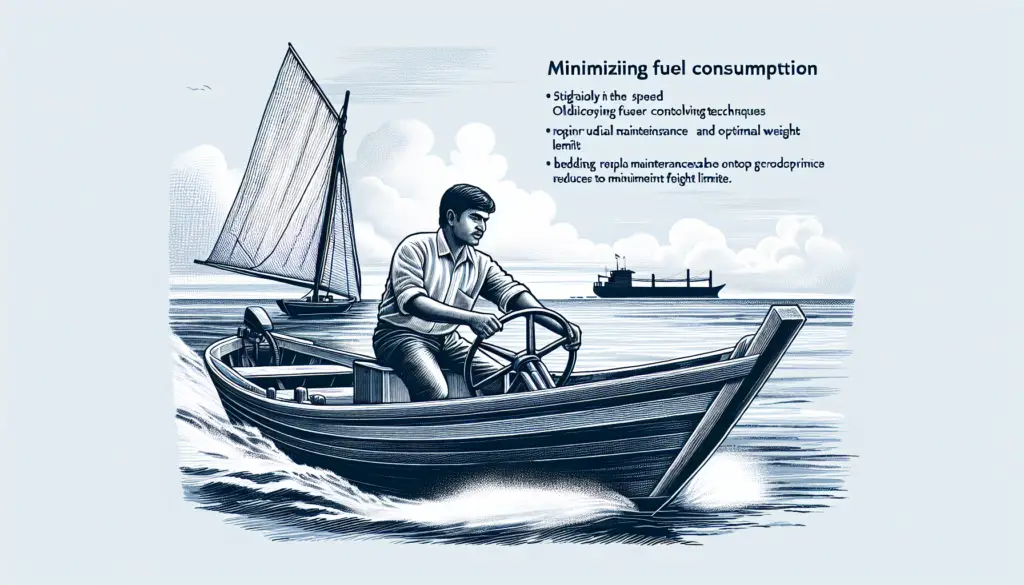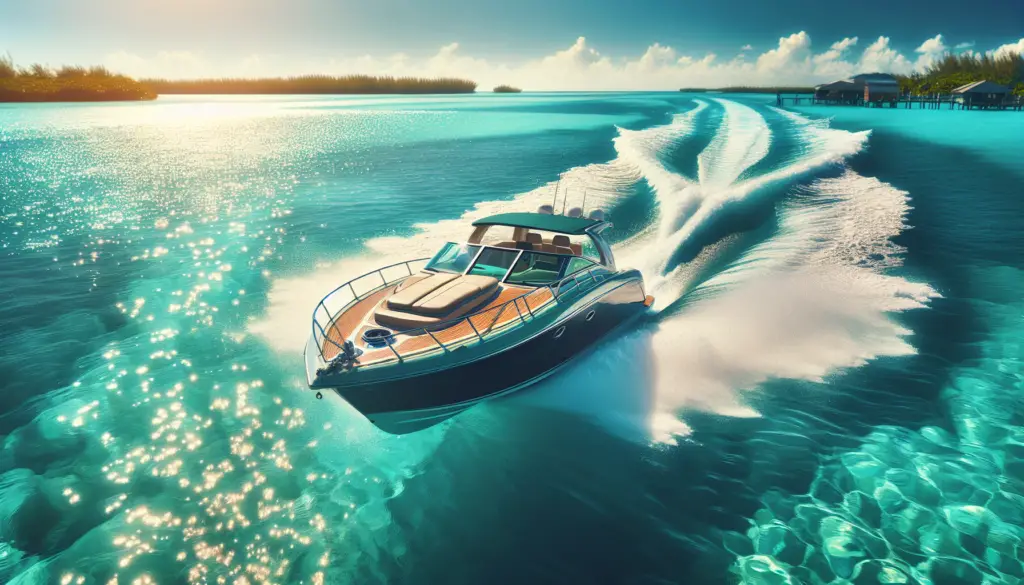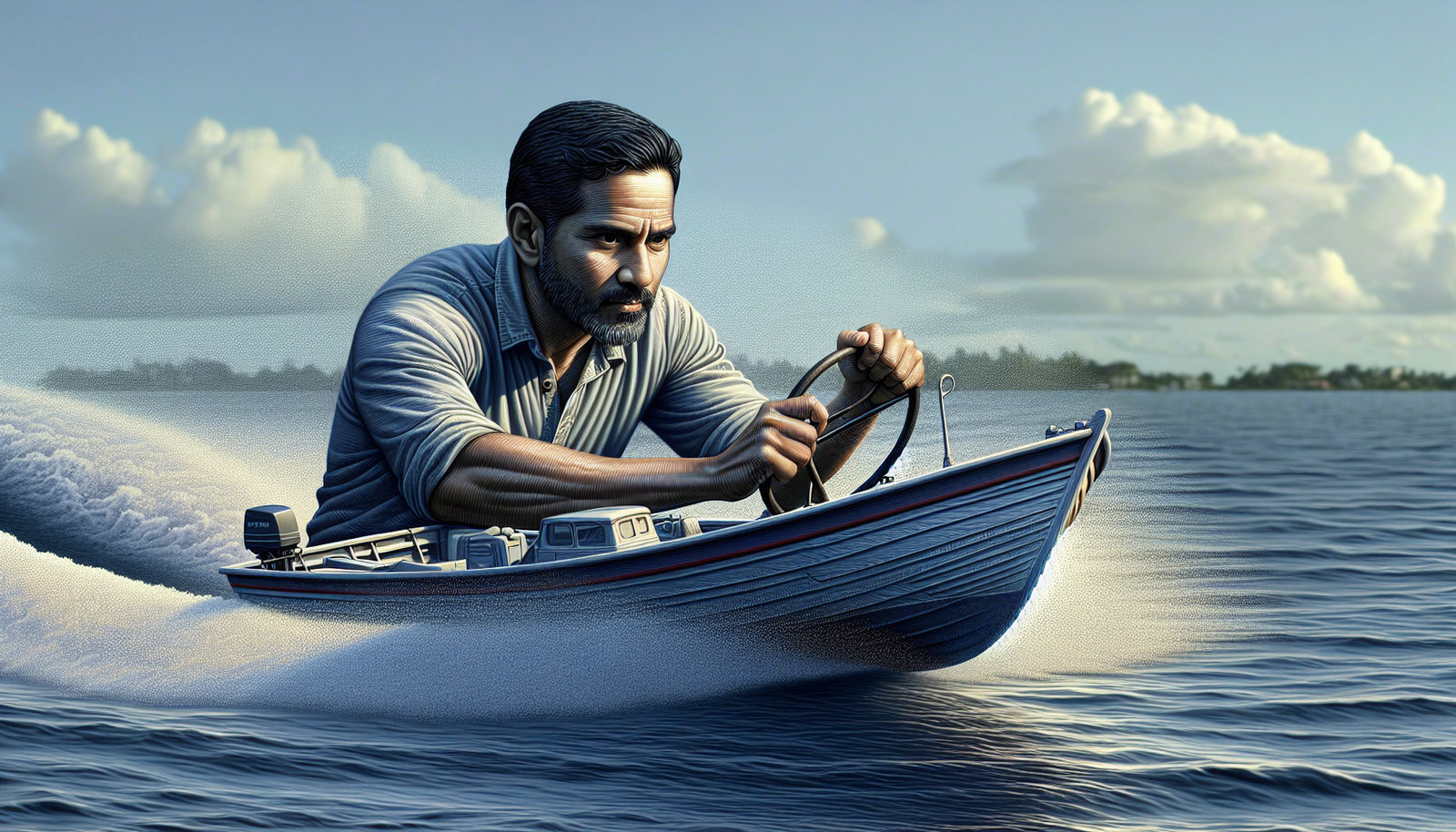Are you looking to cut down on your fuel use whilst enjoying time on the open water? In the article “Top Ways To Minimize Fuel Consumption While Boating,” you’ll uncover strategies and tactics crafted by experts to help you achieve just that. From tips on how to properly maintain your boat to advanced navigation techniques, you’ll find ways to boat more efficiently without sacrificing performance or pleasure. By putting these methods to use, you’ll not only extend your time out in the beautiful blue, but also considerably save on fuel expenses – a win-win situation for any avid boater such as yourself. So, prepare to set sail and keep your wallet fuller with this practical and beneficial guide.

Understand the fuel consumption characteristics of your boat
Understanding the fuel consumption characteristics of your boat can go a long way in helping you manage it. Just like every vehicle, every boat is unique in its own right and so are its fuel requirements and consumption patterns. From its speed to weight and propeller condition, several factors determine the fuel efficiency of your boat.
Knowing the fuel consumption rate at various speeds
Your boat consumes different amounts of fuel at different speeds. Generally, the fuel consumption rate goes up as the speed increases. Thus, it is crucial that you know the sweet spot where your boat is most fuel-efficient.
Understanding the impact of boat weight on fuel consumption
Boat weight is another factor that heavily influences fuel consumption. An overweight boat requires more power to propel, thus leading to higher fuel use. On the other hand, an optimally weighted boat will glide on the waters with ease, ensuring less fuel consumption.
Comprehending the role of propeller condition in fuel efficiency
The condition of the propeller assumes considerable significance in the fuel efficiency game. A propeller in good shape ensures optimal performance leading to improved fuel efficiency. Any damage to them can significantly affect the boat’s propulsion and in turn, its fuel consumption.
Proper maintenance of your boat
Regular maintenance plays a vital role in ensuring that your boat performs its best and remains fuel-efficient. This includes regularly servicing the engine, keeping the hull in good condition, and maintaining the fuel system.
Regular servicing of boat’s engine
Just like a car’s engine, a boat’s engine requires regular maintenance for smooth operation. Regular servicing will prevent any potential issues that could cause the engine to use more fuel.
Keeping the hull clean and in good repair
The hull of your boat should ideally be clean and in good shape. A dirty hull or one covered in algae can create drag, making your boat work harder and consume more fuel.
Maintaining the fuel system and avoiding water or sediment in the fuel tank
A well-maintained fuel system is crucial for efficient fuel consumption. You need to ensure there’s no water or sediment in your fuel, which can affect the engine’s performance and lead to higher fuel usage.

Efficient operation techniques
The way you operate your boat can have a significant effect on fuel consumption. By adopting efficient operation techniques like reducing speed, avoiding rapid acceleration, and ensuring a balanced load distribution, you can save a considerable amount of fuel.
Reducing boat speed
While speed might give you thrills, it comes at the cost of increased fuel consumption. Reducing your boat speed is an effective way to increase its fuel efficiency.
Avoiding rapid acceleration and deceleration
Rapid acceleration and deceleration can take a heavy toll on your boat’s fuel efficiency. Smooth and steady operation is key to preserving fuel while boating.
Ensuring balanced load distribution on the boat
Balanced load distribution on your boat can help in optimizing its performance and enhancing fuel efficiency. Any unnecessary weight can cause your boat to work harder, leading to more fuel consumption.
Use technologies that promote fuel efficiency
Technological advances have gifted us with various tools and equipment that can help improve a boat’s fuel efficiency. You can invest in fuel economy monitoring systems, fuel-efficient engines, and other fuel-saving apparatuses.
Installing fuel economy monitoring systems
A fuel economy monitoring system is a valuable tool that can help you keep track of your boat’s fuel consumption. With this system, you can easily find out when and where your boat consumes the most fuel, and take steps to rectify it.
Investing in fuel-efficient engines
Newer engines are typically more fuel-efficient, thanks to advanced technologies. If you have an older boat, it might be worth considering an engine upgrade for improved fuel economy.
Trying out fuel-saving paraphernalia like foils and trim tabs
There are numerous other products available in the market that promise to reduce fuel consumption, like foils and trim tabs. While they may not bring about monumental changes in fuel efficiency, every little bit helps when it comes to saving fuel.

Plan your boating trips wisely
Proper planning of your boating trips can help in minimizing fuel consumption. Avoid peak hours, opt for less congested routes, and keep a watch on the weather conditions.
Avoiding peak hours and congested routes
Boating during peak hours or choosing congested routes can slow down your journey, thereby consuming more fuel. Try to plan your trips at times when the waters are relatively calm and less crowded.
Planning logical routes to minimize distances
A logical and well-planned route will enable you to cover minimum distances, thereby saving fuel. Instead of going aimlessly, plan your trip keeping in mind the shortest possible routes to your destination.
Monitoring weather conditions for smoother sailing
Smooth sailing enhances fuel efficiency. Always keep an eye on the weather forecasts before setting sail. Avoid rough conditions that could increase fuel consumption.
Proper usage of boat accessories
The accessories and equipment on your boat can also influence your fuel consumption. Unnecessary use of some equipment can heighten the burden on the engine, reducing its fuel efficiency.
Avoiding unnecessary use of on-board equipment that burdens engine
Unnecessary use of on-board equipment can put extra load on the engine, which in turn consumes more fuel to compensate. Only use what’s necessary and turn off any equipment when it’s not in use.
Using sails whenever feasible on sailboats
If you’re on a sailboat, use the sails as much as possible. This will not only save on fuel but also give you an authentic sailing experience.
Minimizing use of air conditioning, heaters, and other power-consuming equipment
Power-consuming equipment like air conditioning and heaters can put a significant drain on your fuel supply. Use them judiciously to conserve fuel.

Choosing the right fuel
Different types of fuel have different energy densities and not all fuels are suitable for every boat. It’s important to use the right fuel to ensure that your boat’s engine runs efficiently and economically.
Understanding different types of fuel
Are you using the right type of fuel for your boat? Each type of fuel has different properties, and using the wrong one can lead to inefficient combustion and wasted fuel.
Knowing the best fuel for your specific boat model
Every boat model has specific fuel requirements. It’s important that you know and use the right type of fuel recommended for your particular boat model.
Keeping an eye on fuel prices and buying at the right time
Like everything else, fuel prices also fluctuate. Keeping an eye on fuel prices and buying when they are relatively low can lead to considerable savings in the long run.
Boating in favorable conditions
Favorable sailing conditions don’t just provide a smoother, more enjoyable ride – they can also contribute to more efficient fuel usage.
Avoiding boating against the wind or tide
Boating against the wind or tide can make your engine work harder, leading to increased fuel consumption. If possible, try to avoid these conditions.
Choosing calm weather for boating
Calm, clear weather is ideal for boating. Without the hindrance of rough water or strong winds, your boat will operate more efficiently and consume less fuel.
Recognizing the impact of water temperature on fuel efficiency
Water temperature can also impact fuel efficiency. Cold water is denser than warm water, which means your boat has to work harder to move through it, consuming more fuel in the process.
Boat aerodynamics
The design and shape of your boat, or its aerodynamics, can heavily impact its fuel consumption. A well-designed, streamlined boat is more fuel-efficient than one laden with items sticking out.
Appreciating the effect of boat design on fuel consumption
Boat design plays a crucial role in determining fuel efficiency. A sleek, streamlined boat creates less drag and therefore, consumes less fuel.
Keeping the boat light and streamlined
Keeping your boat light and devoid of unnecessary attachments can also help improve its fuel efficiency. Every little bit counts!
Limiting drag by reducing items that stick out on the boat
Items that stick out of your boat can create drag, making your boat work harder and consume more fuel. Try to reduce these as much as possible.
Learning from others
Learning from others is a great way to gain knowledge and insights. Other boat owners, forums and online communities can be valuable resources to learn new ways to improve your boat’s fuel efficiency.
Connecting with other boat owners to share experiences and suggestions
Other boat owners can be an excellent source of first-hand information about ways to increase fuel efficiency. By sharing experiences and suggestions, you can learn valuable tricks and ideas.
Participating in boating forums and online communities
Online forums and communities provide a platform for you to connect with other enthusiasts and experts. Participate in discussions and stay updated with the latest information and advancements in boating fuel efficiency.
Staying informed about new advancements in fuel efficiency
Boating technology is always advancing, with new developments in fuel efficiency cropping up every now and then. Stay informed about these advancements and try adopting them, if feasible, to enhance your boat’s fuel efficiency.
By understanding your boat better, maintaining it properly, planning your trips wisely, optimizing usage, choosing the right fuel, boating in favorable conditions, considering your boat’s aerodynamics, and learning from others, you can effectively reduce fuel consumption while boating. Make these strategies a habit, and soon you will witness a significant decrease in your boat’s fuel consumption. Happy sailing!

